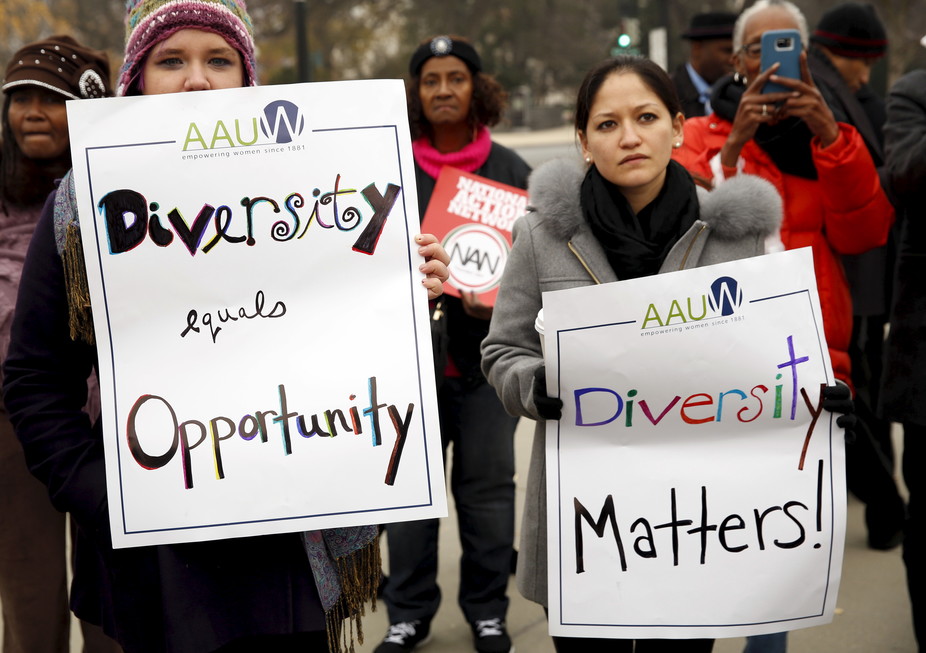Want to change perceptions of Muslims? Support students of all beliefs

Matthew Mayhew, New York University
In the wake of the recent terror attacks in Paris, Baghdad and Beirut, our national discourse has been full of conversations about Muslims in civic life.
Presidential candidates have offered up religious tests as potential barriers to entry for refugees seeking to flee conflict zones. State governors have proposed suspending accepting new refugees in the wake of the attacks.
Despite the recent surge of interest, skepticism about the trustworthiness of Muslims in America is anything but new.
National research data demonstrate that Muslims were ranked in the coldest third on a “feeling thermometer” by their fellow Americans of different faiths.
Even more troubling is the reality that religion-based violence against Muslims represented about 14% of hate crimes in 2013, despite the fact that Muslims comprise less than 1% of the US population.
The national attitude toward Muslims extends into the collegiate environment.
Our research on religious and spiritual campus climate has indicated that only 46% of students believe that Muslims are accepted on campus. But our data also point to ways in which college educators can make a real difference in the ways Muslims are perceived by Americans generally.
Prejudices on campus
Controversy around Muslims on campus has hit the headlines on a number of occasions.
Universities have faced criticism, for example, for providing worship space to Muslim students (most recently at Wichita State in Kansas). Earlier this year, Duke encountered an outcry from alumni after announcing plans to permit Muslim students to sound the call to prayer from the chapel bell tower. Similarly, in 2007 the University of Michigan-Dearborn faced a backlash after installing footbaths for Muslim students on campus.
These situations, unsurprisingly, have an impact on how Muslim students perceive their campus communities.
Bruce Speck’s study of Muslim college students demonstrates that they feel largely unsupported in their religious practices and subject to bias and disrespect both in and out of the classroom.
Incidents such as the murder of three Muslim students in North Carolina earlier this year continue to fuel fear in this community.

Chris Keane/Reuters
It is our belief that these prejudices and misperceptions damage the strength of our American democracy. Higher education has a role to play in beginning to address these challenges.
But what can campus leaders do?
Together with Alyssa Rockenbach at North Carolina State University, we have collaborated on research to answer precisely this question.
Data speak volumes
We developed a survey to examine the attitudes shown and values held by people on university campuses about religious diversity. From 2011-2014, we administered this survey at 52 colleges and universities.
The findings of our research point in some exciting directions for educators seeking to make a positive impact on negative perceptions of Muslims in higher education and beyond.
One of our key questions was related to the idea of how non-Muslim students perceive Islam and Muslims in the world. And following on from that, we wanted to know what experiences help non-Muslim students come to appreciate Islam and Muslims around the world.
We asked non-Muslim students to respond to a series of statements to gauge their level of appreciation for Muslims. These questions included, “Islam values service to others,” “Islam promotes peace,” and “In general, Muslims are moral and ethical people.”
Our subsequent data analysis revealed a variety of interesting trends.
Consistent with the literature on collegiate experiences, our analysis showed that the types of educational experiences students encounter within a campus community are critical in shaping their perceptions and attitudes.
Non-Muslim student appreciation for Islam and for Muslims around the world was associated with:
- participating in interfaith experiences, such as an interfaith service activity or an interfaith dialogue
- having uncomfortable conversations that moved non-Muslim students to examine their own prejudices, and
- engaging in informal opportunities to interact across difference, like dining together or studying together.
However, opportunities to encounter difference did not always lead to greater appreciation of Muslims.
In fact, our research also showed that, among non-Muslim students, the following experiences were associated with a lack of appreciation of Islam:
- attending their own or other formal religious services
- being silenced and feeling unsafe to express their own faith freely on campus, often due to moments of conflict or tension around religion
- feeling as though their college seems to favor certain worldviews above others
- perceiving less support for their own religious or nonreligious identities.
A unique opportunity
What do these data points tell us? As the number of Muslim college students continues to grow, college educators have a unique opportunity to create and support productive meeting spaces that promote positive attitudes toward Muslims among non-Muslim college students.
As the number of international students from a variety of religious traditions increases on college campuses so will the opportunities for these students to return to their nations as leaders. Our work hopes to equip these future leaders with the tools needed to effectively and productively engage across religious differences.
However, increasing diversity on campus is only part of the solution.

Religious diversity needs support.
Pass a Method, CC BY-SA
In fact, the mere presence of diversity on campus may actually harm relations among communities, as diversity left unengaged and unsupported can lead to greater isolation and distrust.
Educators, we would argue, have the responsibility to appropriately design and thoughtfully support opportunities for interaction where students can genuinely learn and get to know one another.
Simply attending a religious service on or off campus or participating in a religious course is not enough.
Students are profoundly impacted by their own experiences of inclusion and exclusion. When they themselves feel safe and respected, they more readily extend a welcoming hand to others.
This suggests that educators must give greater attention to campus climate around religious identity and diversity as a whole.
Although students are less likely to formally identify with a religion over the course of their studies, there has been a notable increase of students who participate in voluntary religious activities since the 1990s.
Faculty, staff and other campus leaders play a critical role in shaping a community where all feel welcomed.
Let us be clear: we believe these data give us the opportunity to change the news headlines of the future. Our research indicates that creating thoughtful educational experiences and building a constructive campus climate for all around religion has the potential to change hearts and minds about all Muslims.
It’s worth noting that those benefits are not limited to Muslims. Jewish, atheist, Mormon students and more would all benefit from this type of collegiate experience.
If higher education were to prioritize this work, how might the world respond differently in the wake of major global events related to religion? We challenge educators to help us discover the answer to that question.
This piece was coauthored with Mary Ellen Giess from the Interfaith Youth Core.
![]()
Matthew Mayhew, Associate Professor of Higher Education, New York University
This article was originally published on The Conversation. Read the original article.




